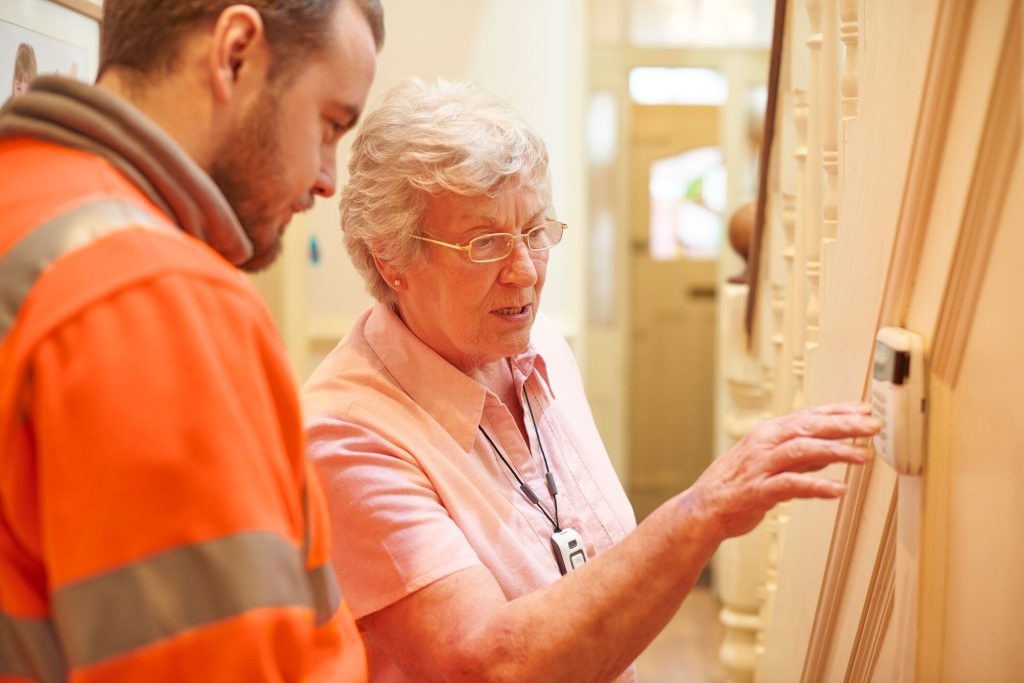Home security is a top priority for everyone, especially seniors who may live alone or have specific safety concerns. With advancements in technology, there are many home security systems available, each offering various features to enhance safety and peace of mind. In this blog post, we’ll explore how to choose the right home security system for seniors, ensuring they stay protected and feel secure in their homes.
1. Understanding Home Security Systems:
Home security systems are designed to monitor and protect your home from intrusions, emergencies, and other potential threats. These systems typically include a combination of sensors, cameras, alarms, and monitoring services that work together to detect and respond to security breaches.
2. Key Features to Consider:
When selecting a home security system, it’s important to consider features that cater to the specific needs of seniors. Here are some essential features to look for:
24/7 Monitoring:
A professional monitoring service ensures that help is available at all times. If an alarm is triggered, the monitoring center can quickly alert emergency services, providing an extra layer of protection.
Emergency Response:
Look for systems that include panic buttons or medical alert devices. These features allow seniors to call for help immediately in case of an emergency, such as a fall or medical issue.
Ease of Use:
Choose a system with a user-friendly interface. Seniors should be able to easily arm and disarm the system, as well as understand how to use other features like emergency buttons and cameras.
Wireless Technology:
Wireless systems are easier to install and typically require less maintenance. They also allow for flexibility in placement and can be moved if the senior relocates.
Home Automation:
Some systems offer smart home features, such as remote control of lights, locks, and thermostats. These can enhance convenience and safety, allowing seniors to manage their home environment more easily.
Video Surveillance:
Cameras can provide an added sense of security by allowing seniors to see who is at the door or monitor different areas of their home. Look for systems with high-definition cameras and night vision for clear visibility.
Environmental Sensors:
In addition to intrusion detection, consider systems with smoke, carbon monoxide, and flood sensors. These can alert seniors to potential dangers like fires, gas leaks, or water damage.
3. Popular Home Security Systems for Seniors:
Several home security systems are well-suited for seniors, offering a range of features and benefits. Here are some popular options:
ADT:
Known for its reliable 24/7 monitoring service, ADT offers a comprehensive range of security solutions, including intrusion detection, video surveillance, and emergency response. ADT’s systems are professionally installed, ensuring optimal performance and ease of use.
SimpliSafe:
This user-friendly system is easy to install and offers flexible monitoring plans. SimpliSafe provides a range of equipment, including entry sensors, motion detectors, and cameras, with no long-term contracts required.
Vivint:
Vivint combines advanced security features with smart home technology. Their systems include professional monitoring, video surveillance, and home automation options, making it easy for seniors to control their security system and other devices from a single app.
Frontpoint:
Frontpoint offers wireless systems with DIY installation and 24/7 professional monitoring. Their intuitive mobile app allows seniors to manage their system remotely and receive instant alerts.
Medical Guardian:
While primarily a medical alert system, Medical Guardian also offers home security features, including door sensors and surveillance cameras. This is an excellent option for seniors who prioritize health monitoring and emergency response.
4. Installation and Maintenance:
When choosing a home security system, consider the installation process and ongoing maintenance requirements. Some systems require professional installation, while others offer DIY options. Professional installation ensures that the system is set up correctly and functioning properly, but it may come with additional costs. DIY systems are typically more affordable and allow for easy setup, but they may require some technical know-how.
Regular maintenance is essential to ensure the system continues to operate effectively. This includes checking batteries, updating software, and testing sensors and alarms. Many security companies offer maintenance plans or services to help keep your system in top condition.
5. Budget and Costs:
Home security systems come with varying costs, depending on the features and services included. When budgeting for a security system, consider the following expenses:
Initial Equipment Cost:
This includes the cost of sensors, cameras, control panels, and other components. Some companies offer packages that bundle essential equipment at a discounted rate.
Installation Fees:
If you opt for professional installation, there may be an additional fee. DIY systems typically eliminate this cost.
Monthly Monitoring Fees:
Professional monitoring services charge a monthly fee for 24/7 monitoring and emergency response. These fees vary based on the level of service and features included.
Maintenance and Upgrades:
Factor in potential costs for ongoing maintenance, battery replacements, and system upgrades.
It’s important to choose a system that fits your budget while still providing the necessary features for safety and peace of mind.
6. Additional Tips for Enhancing Home Security:
In addition to installing a security system, there are several other steps seniors can take to enhance their home security:
Secure Doors and Windows:
Ensure all doors and windows have sturdy locks and are in good condition. Consider adding deadbolts or security bars for extra protection.
Outdoor Lighting:
Install motion-sensor lights around the exterior of the home to deter intruders and improve visibility.
Neighborhood Watch:
Participate in or start a neighborhood watch program to increase community awareness and cooperation in preventing crime.
Regular Checks:
Conduct regular checks of your security system and home environment to identify and address any potential vulnerabilities.
Conclusion:
Choosing the right home security system is crucial for ensuring the safety and well-being of seniors. By considering key features, popular system options, installation and maintenance requirements, and budget considerations, seniors can find a security solution that meets their needs and provides peace of mind. Remember, enhancing home security is about creating a safe and comfortable living environment, allowing seniors to enjoy their golden years with confidence and security.

